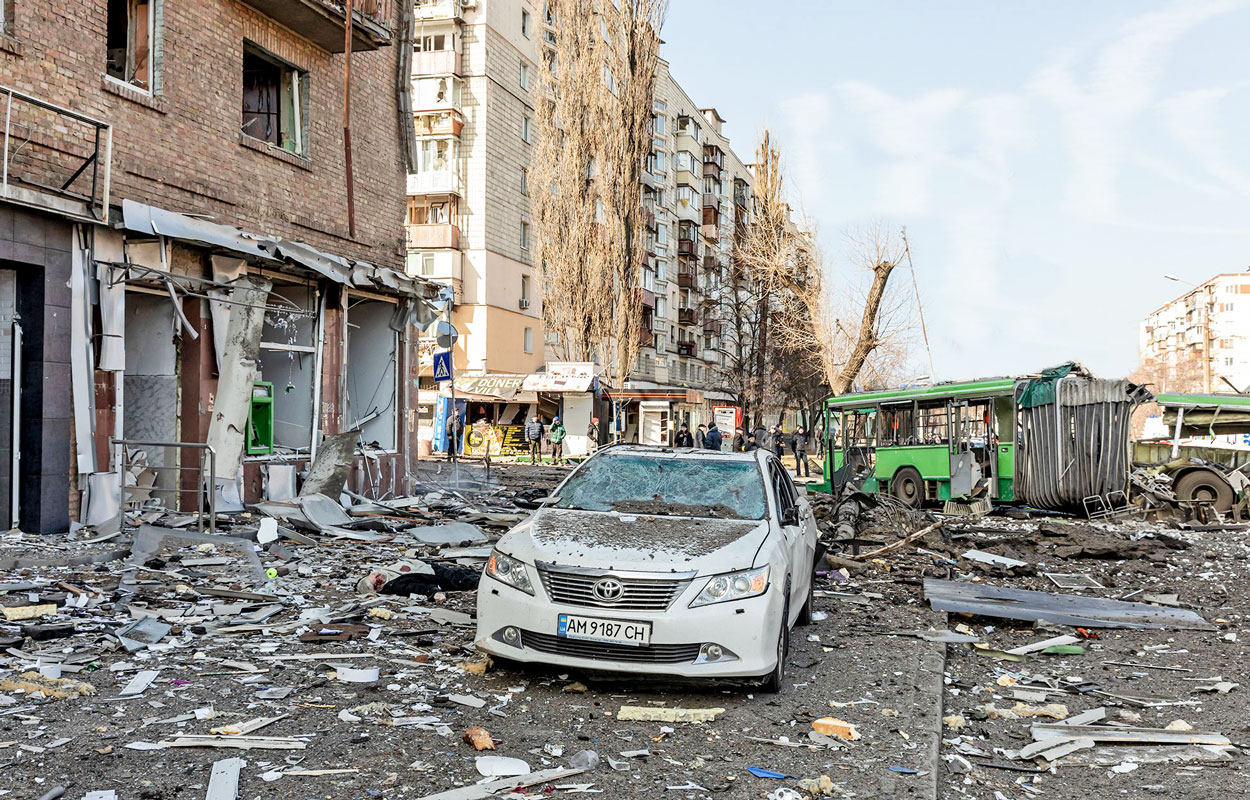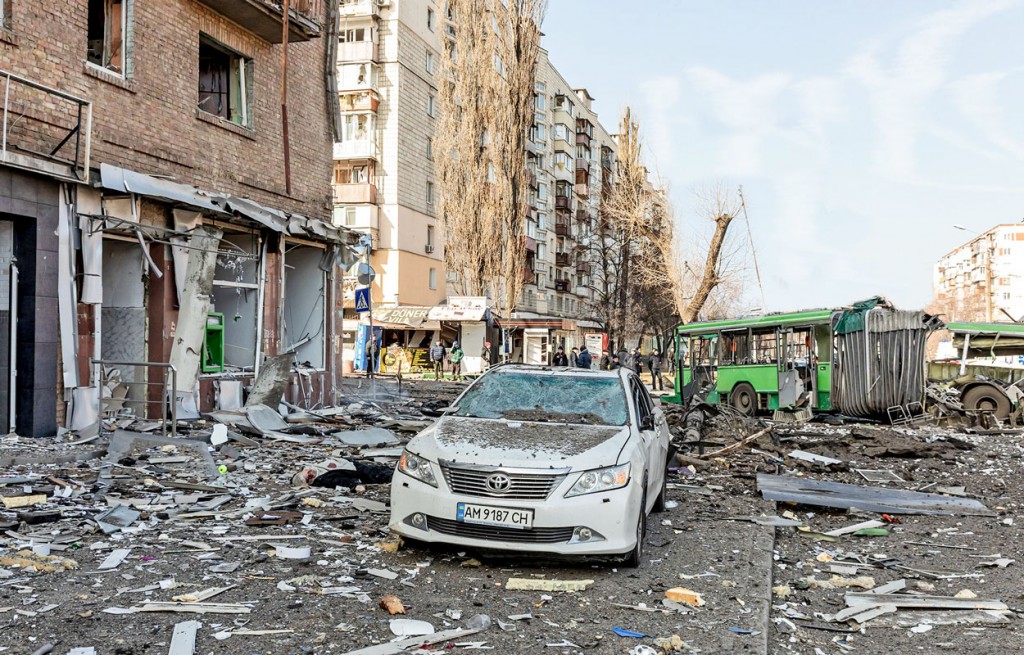
In a heartrending interaction organised for Rotary regional magazine editors, Mykola Stebljanko, the publisher for Rotariets, the Rotary regional magazine for Ukraine, a past district governor and public image coordinator, RI District 2232, informed the Rotary world about the work being done in the war-ravaged country by the Rotary clubs of Ukraine to help the battered people of their country.
This, the Rotarians are doing, placing their own lives in danger. Some of the stories related on the virtual meet were deeply moving and distressing.
Oleksii Lukash, past president of RC Kyiv, described how his full-term pregnant wife woke him up in the morning saying that Russia had attacked Ukraine. “I couldn’t believe such a thing can happen in the 21st century. So I told her let’s go back to sleep! But within minutes, we had to wake up as I started receiving dozens of calls from colleagues and friends, saying that it is actually a war!”
Kyiv, the capital, is the biggest and most populated city of Ukraine. “Everywhere around us, we could see people jumping into their cars and moving in different directions. For the first few days (the zoom meet was on March 8) we remained in Kyiv, which was still normal. He of course had a special reason not to leave; his wife could deliver any day, any time. “It was horrible, because virtually every hour we were listening to raid alarms all over the city. My colleague had to stay in bomb proof shelter for one week, and only after one week, and risking his life, he left the shelter safely.”

But others were not so lucky; “I know so many of my friends tried to run, but were shot. Luckily, they survived, and we were desperately searching for blood plasma, and for the treatment of the injured.” Lukash and his wife had to stay put under these terrifying circumstances, “for three more days. It was really very tough, as my wife was constantly crying and I was very scared that it would affect the baby.”
Curfew was imposed regularly. Luckily three days after the war started, she was admitted to the nursing home and delivered a baby boy, but within few hours “we were forced to go to the bomb shelter. We soon noticed that the situation was becoming worse and worse, there was shortage of both petrol and food and we managed to first move to the country house of our friends in the western part of Ukraine who had already left and they were kind to provide us their house. But next day something exploded loudly right outside the house and we found that the airport was very close!”

Lukash is grateful as “my colleagues from RC Kyiv are constantly in touch with us.” Along with delivering humanitarian aid to civilians injured in the bombing, Kyiv Rotarians are also helping to give supplies to military hospitals “as there are lot of injured soldiers. So several projects are going on and we are constantly in touch with volunteers and hospitals to reach medicines wherever they are required.”
At present Lukash is in Poland with his family, including his baby boy the couple has named Elisey. “I am grateful to the Polish people who are helping us a lot,” he adds gratefully.
We opened special accounts in euro, US dollars, pounds and (Swiss) francs, and from the donations we have received from Rotary clubs and districts, we have been reaching medicines that are required urgently by the hospitals.
— Mykola Stebljanko, PDG and publisher, Rotariets
Addressing the meeting from the city of Odesa, in south Ukraine, where he lives, PDG Stebljanko, a member of Rotary E-Club of Ukraine, gave an overview of the sufferings of the people of Ukraine now under attack from Russia and the steps Rotary International and Rotary clubs across Ukraine have been taking to render humanitarian aid to the affected people. He is also the coordinator for foreign partnerships for the Ukraine crisis.
Displaying a map of his country, which showed the areas under Russian bombardment (as on March 8), he said “many cities in Ukraine are under military action; almost half of the cities in the east and south Ukraine are under either occupation or some form of military activities. So many people have left for Poland, Hungary, Moldova, Romania and Slovenia.”
He said that from the “beginning of the war, Rotary in Ukraine has started different kinds of activities… we created a special coordination committee which meets twice daily and discusses what we can do for the different challenges that we face now.”
One of Rotary’s main areas of focus in Ukraine right now is to help the hospitals, which are now full with wounded civilians. “We opened special accounts in euro, US dollars, pounds and (Swiss) francs, and from the donations we have received from Rotary clubs and districts, we have been reaching medicines that are required urgently by the hospitals. Also, RI has opened a special disaster fund to support Ukraine and Rotarians around the world can donate to this fund to support the people of Ukraine.”
I used to just say that Rotary International is a big family, now I really believe it, and am convinced that this is a family that will stand by you.
— Rtr Iryna Bushmina, the DRR from Ukraine, RID 2232
Till the previous day, (March 7), the RI fund had already collected over $1 million; “this money will be spent on special disaster relief grants. There is a difference between a GG and disaster funds, the main one being the procedure for getting an approval is very fast.”
Giving an example, he said his district had already applied for this grant, “and the application is only one sheet of paper.” The grant was also available to help Ukraine refugees in Slovakia, Romania and Hungary and all the information is available on www.myrotary.org, and the application for these grants could go up to $50,000.
Stebljanko explained that “our need mainly is humanitarian help. Lots of countries have sent to Ukraine humanitarian help by planes, for eg, from Poland, and that is transferred by road and distributed to the cities where help is required. We have also created Rotary humanitarian units, where aid is collected and distributed to different cities. Our activities have helped our Rotary families, their relatives and friends.”

He added: “My city, Odesa, is presently not under military action but each morning we wake up with the thought that any moment military action can come… we are facing a very, very anxious situation.”
Sharing her personal and club experience, Irina Ivanova, secretary, RC Kharkiv New Level, said that her city, Kharkiv, was “one of the most destroyed cities in Ukraine. Every day, our factories, offices and houses are being ruined. Public transport doesn’t work.” Living in one of the bigger cities in Ukraine with a population of 2 million, the Rotarians of Kharkiv, “started our humanitarian project as fast as we could. First, we started giving out warm waterproof blankets to civilians who had lost their houses. Because of war most of the time people live in bomb shelters; we need 6,000 more blankets and are continuing to raise money.” Rotarians are also organising volunteers to deliver food and medicines “but they are working in a very dangerous situation,”
she added.
The clubs have also organised “many thousands of kg of chicken; many countries have offered to send us help which is welcome. The Rotary clubs are also making special efforts to help single mothers, disabled and the elderly, who can’t help themselves. Many people are without any financial support, and we transfer 100 euros to such people… have spent 30,000 euros on this project alone.”
In the special kitchens “we supply vegetables, meat, flour, sugar and have invited volunteers who can cook for 1,000 people.” Irina and her family have left Kharkiv and now live in western Ukraine. “I hope war will end soon and we can return to our homes safe,” she adds poignantly.

Orest Semotiuk, the public image chair, RC Lviv International, who lives in Lviv, said he helps to coordinate with international journalists who have been coming to the war-ravaged country in the last 10 days. “Many Ukrainians are counting days for the war to get over; today is the 16th day of our struggle since the Russian invasion, and the UN has estimated that already there are 200,000 refugees (as on March 8) from Ukraine who have fled to other countries. In 2012, we had built a huge stadium and it has become a big centre for refugees, there is a hotline where people can call and register.”
He added that the city has curfew and also “city patrols units, and they have weapons and thanks to them, many ‘bad instances’ were prevented.”
Europe’s Rotaractors mobilise 2,000 families for Ukrainian refugees
Really inspiring is the story of Rtr Iryna Bushmina, the DRR from Ukraine, RI District 2232. In her first-person account, published as an RI blog, she says she left Kyiv “in the first hours of the war. My sister, her husband, her three-month-old baby and a cat, were in the car.” When they reached the border, men were prevented from leaving the country, so she, her sister and nephew continued to drive.
After a harrowing six days, they reached Vienna, staying the nights in three different countries, thankfully, not in hotels but the homes of Rotarians and their families. “I used to just say that Rotary International is a big family, now I really believe it. And I am convinced that this is a family that will stand by you. These are no longer beautiful words to me, this is reality.”
But while driving, the traumatised Rotaractor thought positively; surely she wasn’t the only person who needed help and support. Why not mobilise Rotaractors in Europe? As her sister was driving, “I had my hands free. I started writing in groups where there were Rotaractors about the situation in Ukraine. A lot of Rotaractors instantly responded. People immediately created groups with different focus areas and helped me to lead them. These were not perfectly thought-out projects, but they were projects that started working from the first day.”
Amazingly, and with the speed of the young, Rotaractors responded quickly, and “we began with small projects to help Rotarians and Rotaractors of Ukraine find accommodation in other countries. Now, the project has grown, and we are helping many Ukrainians find a new home for the first time. We have lined up more than 2,000 host families to take in refugees.”
Apart from helping the fleeing Rotarians find homes, the Rotaractors are also providing humanitarian aid; “the biggest need now is to find helmets, thermal images, body armour and the like for the Ukraine defence forces,” writes Iryna.
She says that “what hurts the most” is that they are not able to fulfil simple requests for food and water for the people in Ukraine, as the “the Russian army is blocking us from bringing humanitarian aid to civilians and they are dying from hunger and dehydration.”
Her international team of Rotaractors has over 100 people, and her team in Ukraine has some 50 people. They are all working to disseminate the right information on the present state of affairs in Ukraine; find accommodation and hosts for Ukrainians fleeing the war zone; sending humanitarian aid and securing financial support for those who need it.
The young woman says that not all those they have helped have written back to express their gratitude, but this is understandable as they are under huge “fear and stress, spending three to four days at the border… we do not need them to say, “thank you”. We just need to make sure these people are safe and that they get what they need to survive and help others. Now is the time for understanding. Of course, when some of the people do write their appreciation, it is a pleasure!”











